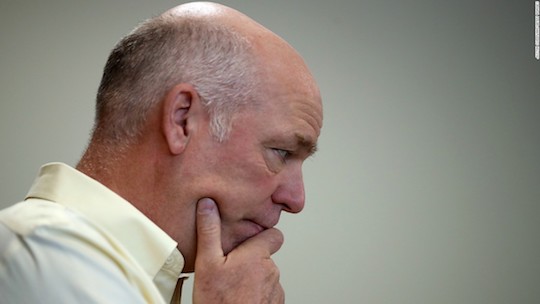Montana votes today in the special election to fill our only seat in the House of Representatives, and Greg Gianforte has given us a lot to think about. Last night, the Republican candidate attacked a reporter for the Guardian, throwing him to the ground and punching him in response to a question about the Republican health care plan. The Gallatin County Sheriff’s Department has charged Gianforte with assault. Lee newspapers have rescinded their endorsement. Chris Cillizza has pronounced today’s vote a lose-lose situation for Republicans, whereas Chuck Todd calls it a lose-lose for Democrats. The takes are flying fast, and the first salvo has necessarily consisted of first ideas.
Speaking of first ideas, the logical way to put a national news peg on a story about Montana’s special election is to call it a referendum on Trump. I can think of more than one reason to resist that interpretation, though. When Gianforte ran for governor in November, he underperformed Trump by ten points, losing a state that the Republican at the top of his ticket won easily. Since then, he has restyled himself as a full-throated supporter of the Trump agenda. But even if Gianforte is now running on the president’s message, today’s election won’t necessarily tell us what Montanans think of it, because the Democratic candidate is deeply flawed.
Like Gianforte, Rob Quist has never held elected office. He is best known as the former singer in a country-rock group called the Mission Mountain Wood Band. His party selected him in the hope that his name recognition would give him an advantage in the short election, but they seem not to have run a credit check. Weeks into the campaign, it was revealed that the IRS had filed liens against the Quists for unpaid property taxes in 2011, and that they stiffed a Kalispell excavation contractor in 2001. His campaign, staffed by old hands in the state party, has done a poor job managing the news cycle and allowed opposition researches to pound a steady beat of such embarrassing revelations, including last week’s speculation that the Quists have avoided paying taxes on rental income.
Thus far, the Quist candidacy has been a referendum on Montana Democrats’ willingness to take what their party offers them. Given his dismal performance and Gianforte’s proven ability to contradict national trends, I don’t think you can call today’s vote a referendum on President Trump. Oh yeah—there’s also this thing where one of the candidates assaulted a reporter twelve hours before the polls opened.
I don’t know how much impact that will have. As Cillizza points out, around 70% of the expected total ballots have already been cast by mail. The remaining 30 percent is more than enough to swing the outcome—but who knows how many people who vote today, in person, are getting the news within 18 hours of publication? Given the exceeding strangeness of last night and the many uncontrolled variables in the campaign up to this point, I don’t think what happens today will tell us anything for certain about the national mood. It’s a nice peg, but let us be careful not to hang too much on it.



